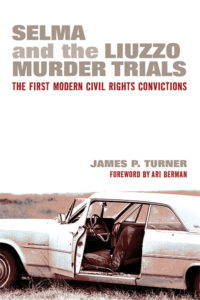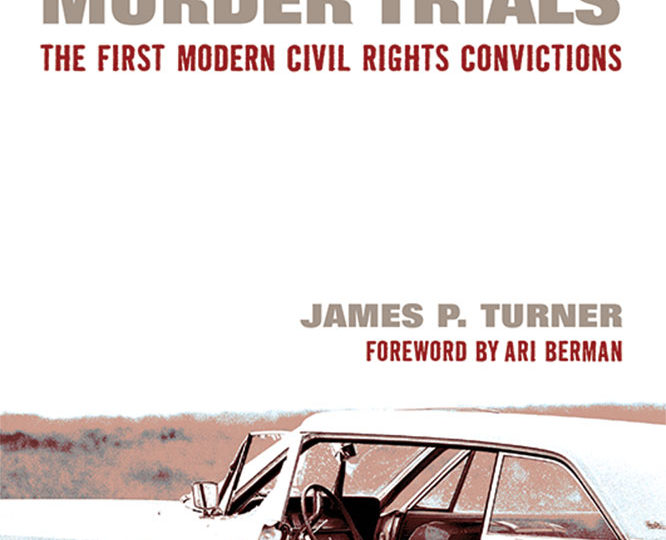
“The Beginning of the End” of Klan Terror: Joseph Bagley Reviews James Turner’s Memoir of Three Trials
Jim Turner, a veteran of the Justice Department’s Civil Rights Division (CRD), has written a pithy and compelling memoir of three trials that, he argues, inspired a generation of civil rights prosecutions and marked “the beginning of the end of excusing illegal Klan terrorism” and “a brand-new tradition of equal justice under the law” (96).
When civil rights activists descended upon Selma in late February 1965, registered black voters were almost nonexistent in the Alabama Black Belt, where outnumbered whites violently defended white supremacy. During the ensuing demonstrations, a state trooper shot and killed an unarmed activist in a nearby town. Organizers in Selma then attempted to march in protest to the state capitol in Montgomery, 50 miles down U.S. Highway 80. As they began, they were set upon, beaten, and gassed by state and local police, in an attack that would come to be known as Bloody Sunday.
The Southern Christian Leadership Conference, joined by the NAACP Legal Defense Fund and the U.S. Department of Justice, sued to enjoin further state interference. In Williams v. Wallace, U.S. District Judge Frank Johnson ordered the state to permit the march and protect the marchers. A mother of three from Detroit, Viola Liuzzo, was moved to drive south and join the march. The evening of its culmination, she and local activist Leroy Moton were driving to Montgomery to ferry marchers back to Selma, when Ku Klux Klansmen from Birmingham, one of them a paid FBI informant, sped up and pulled alongside her vehicle. Twenty-two-year-old Collie Leroy Wilkins fired into the car, killing Liuzzo.
Turner joined the CRD in February 1965 and was soon dispatched by division chief John Doar to help investigate the Liuzzo killing. The case was “solved overnight” (6). The Klan vehicle had been stopped by police in the vicinity, and the FBI informant, Gary Thomas Rowe, had identified Wilkins as the shooter, which ballistics testing would confirm. As the state prepared to try Wilkins on a first-degree murder charge, Doar was dubious. All-white, all-male juries in the Black Belt did not convict klansmen for these types of crimes. So Doar prepared to try the perpetrators on charges of conspiracy to violate civil rights, using Reconstruction-era anti-Klan laws. Turner draws from trial transcripts, press coverage, and his own recollections and notes to narrate the three dramatic trials that ensued.
U.S. Attorney General Nicholas Katzenbach reluctantly agreed to allow the state to proceed first. Doar put Turner in charge of providing federal evidence to Lowndes County prosecutor Arthur “Bubba” Gamble, who secured an indictment and prepared to try the accused separately, beginning with Wilkins. Under provisions of Alabama law (explained in Turner’s footnotes), peremptory challenges by defense counsel resulted in a jury that included known members of both the Klan and the Citizens’ Council, a white supremacist organization whose primary weapon was economic reprisal against civil rights activists and insufficiently militant whites.
Turner is at his best when describing nuances that escaped transcription. For example, when pronouncing the victim’s name, defense counsel Matt Murphy (the self-proclaimed general counsel for Alabama’s United Klans of America) would “screw up his face and slowly form each syllable – playing on anti-Catholic and anti-Italian bias, ‘Lye-oooze-zoh’ – as though it were a word from another language and was difficult or distasteful to say” (42). Murphy disparaged civil rights organizers as “communist niggers and Jews” riding around with white women, impugned Liuzzo’s character using “knowing looks at the jury” and “self-satisfied leers” (47), and suggested Rowe was a liar who had broken a solemn Klan oath. Turner called Murphy’s evidence-optional performance “the flimsiest effort by a defense counsel I ever sat through.” Nonetheless, the local judge allowed Murphy’s “antics” to continue and the jury deadlocked.
A second state trial saw Murphy replaced by former Birmingham mayor and arch segregationist Art Hanes, and Gamble replaced by state attorney general and purported racial moderate Richmond Flowers, whom Turner correctly presents as more politically ambitious than principled. Turner challenges multiple assertions in Flowers’s authorized biography, and blames the Attorney General’s “political grandstanding” for Wilkins’s outright acquittal (76).
The CRD pushed forward with a federal trial of all three defendants. Though the maximum sentence for conspiracy to violate civil rights was only 10 years, the chances of conviction were greater, both because of the CRD’s preparation and resources and because a federal trial could include female and black jurors. Furthermore, the trial would be presided over by Frank Johnson, whom Turner aptly describes as a judge who demanded “strict compliance with the Constitution and federal law in civil rights cases” and who “would not tolerate” any “Matt Murphy-type shenanigans” (78). Doar decided to present the case himself and tasked Turner with taking notes and supplying him with information from CRD’s files for each witness called at trial.
Art Hanes repeated the defense’s strategy: romanticize the Klan, discredit Rowe as a “Judas Iscariot,” and blame civil rights activists for violence. The jury initially claimed to be deadlocked, despite Johnson’s careful jury instructions, praised by Turner as “the most impressive judicial performance I have ever witnessed.” But Johnson requested further deliberation under an “Allen charge”—instructions requesting holdouts to accept the duty to decide the case. The ensuing guilty verdict marked the “first time in modern American history that an Alabama jury had convicted a klansman for a killing in a civil rights case” (89).
This is a fascinating and well-written inside account of three seminal convictions that complements other histories of freedom struggles in Alabama, especially Hassan Kwame Jeffries’s Bloody Lowndes (2009), and anyone interested in civil rights law would do well to read it.
Joseph Bagley
Assistant Professor of History
Perimeter College, Georgia State University
Joseph Bagley is Assistant Professor of History at Perimeter College. His book, The Politics of White Rights: Race, Justice, and Integrating Alabama’s Schools, will be published this fall by the University of Georgia Press in the Politics and Culture in the Twentieth Century South Series.


